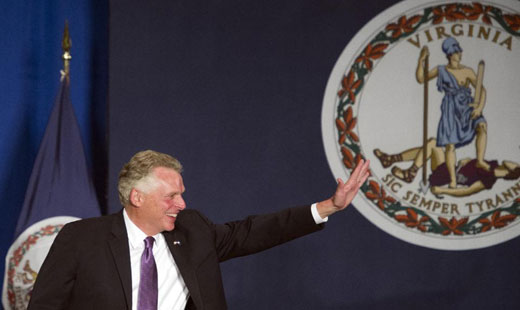
On Tuesday, Virginia held state elections for governor, lieutenant governor, state attorney general, all 100 members of the Virginia House of Delegates, and some local offices.
In a non-presidential year, the turnout for the Republicans should have been higher than for the Democrats, but in this election that was partly negated, giving the Democrats a modest win, and the Republicans, especially their “tea party” wing, a significant reverse. Overall turnout was still low, at 37 percent.
In the gubernatorial election, Democratic Party figure Terry McAuliffe beat hard-right Republican Attorney General Ken Cuccinelli by 48 percent to 45.5 percent, with Libertarian Party candidate Robert Sarvis winning 6.6 percent. For lieutenant governor, Democratic State Senator Ralph Northam beat another Tea Party extremist, Bishop E.W. Jackson, by 55.3 percent to 44.9. For attorney general, the vote between two state senators, Republican Mark Obershain and Democrat Mark Herring, is too close to call, with Obershain ahead by fewer than 300 votes out of 2 million. A recount is certain.
The current attorney general and defeated gubernatorial candidate, Cuccinelli, used his position to carry out a number of crackpot tea-party aligned campaigns aimed at restricting rights to birth control and abortions, as well as going after a former University of Virginia climate sciences professor who annoyed him by his work on global warming.
Although economic concerns were foremost in voters’ minds, the abortion issue seems to have cost Cuccinelli dearly, especially among women. Obenshain at one point supported legislation to require every woman who has a natural miscarriage to report the matter to the police. Herring is a liberal Democrat and would likely oppose such nonsense.
There will be little change in the House of Delegates. In the 2nd District, the Democrat, a young African American newcomer to electoral politics, Mark Futrell, eked out a victory over Republican L. Mark Dudenhefer, a tea party-aligned extremist incumbent. Some other House races are still too close to call, but it is clear that the Republicans will maintain their large majority in the House, which was 65 to 32 and two vacancies going into yesterday’s election. Incumbent advantage and gerrymandering of legislative districts are a major cause for this retention of Republican power.
There will probably be a number of recounts in delegate races. And whoever is elected attorney general will have to step down as state senator, leading to a special election for the seat. This is important, because the Virginia State Senate is now tied 20-20 between Republicans and Democrats. The lieutenant governor, now to be Mr. Nordstrom, has a tie-breaking vote for some bills.
In the governor’s race, pundits are not so much asking why McAuliffe won as to why he did not win by a bigger margin, as projected in some polls. McAuliffe raised more funds than Cuccinelli, who went into the election with massive baggage of his own – his ideological extremism, and some conflict of interest questions.
To this was added public anger at the government shutdown, which hit Virginia, with its large numbers of employees of the government and of government contractors, especially in the Washingon D.C. suburbs and exurbs and the military bases and shipbuilding industry in the region around Norfolk, Portsmouth, Hampton and Newport News.
The incumbent Republican governor, Bob McDonnell, is involved in a massive scandal involving personal gifts from state government contractors. Labor, women’s, and minority organizations all worked hard for McAuliffe, who also had support from big business interests, from the Clinton forces in the Democratic Party, and from some defectors from the Republican Party.
Counterbalancing this was the fact that McAuliffe has never held public office and is seen by most as a money man for the Democratic Party establishment. He also had baggage related to personal business interests which had been touted as bringing jobs to Virginia but ended up bringing them to Mississippi. Democratic Party campaign strategists may have relied too much on Republican negatives, and did not put forth a clear enough vision of how they would govern.
There is also a question of what impact the Libertarian Party candidate for governor, Robert Sargis, might have had on voting patterns. Polls suggested that he would take votes from the Republicans and this panned out to some extent, but he also had a relatively high vote total among youth (15 perent), usually Democratic voters.
McAuliffe’s and Northam’s victories were assured by large totals piled up in certain demographics: Among women, among African-Americans and other minorities, and in almost all Virginia cities. Areas of high unemployment seem to have broken for the Republicans. Areas with higher and lower incomes went to the Democrats, but those with middling incomes trended Republican. Virginia is a “right to work” state. The result is a low level of unionization (about 4.4 percent of the work force). Virginia’s elections are a special target of coal mining and other energy related interests (with the Koch brothers having a major role).
Photo: Terry McAuliffe. Cliff Owen/AP












Comments